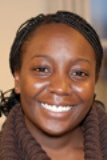 Heather Wallerson Krog first came to Denmark in 2002 as a student in the Danish Institute for Study Abroad.
Heather Wallerson Krog first came to Denmark in 2002 as a student in the Danish Institute for Study Abroad.In a globalized world, travel is increasingly seen as a critical part of rounding one’s character, and an essential part of an undergraduate career. Yet, comparatively few students of color are going abroad. Those that do can find themselves in countries where they are a distinct minority, making the transition away from home and other familiar places even more difficult.
Denmark does not immediately come to mind when thinking of popular study abroad destinations. In fact, according to the Institute of International Education (IIE), it ranked 21st on the list of countries students flock to. Yet the Danish Institute for Study Abroad (DIS) has a uniquely sensitive approach to accommodating the minority students who do travel there. To assist their integration into Danish life, the Institute created the Diverse Identities Social Club, directed by Heather Wallerson Krog, an American-born expatriate.
The club’s goal is to help students find others with similar identities and backgrounds, as well as provide support as they navigate through an unfamiliar culture. “In essence it creates an open and safe space for students to talk about the cultural and identity journey that they’re on while studying abroad,” Krog said.
The conversation is complicated by that fact that few minority students are afforded the chance to travel during their postsecondary studies. Statistics show that study abroad is overwhelmingly the province of White, female students. According to Open Doors data from the IIE for the 2011/12 academic year, 64.8 percent of students who went abroad were women, compared to 35.2 percent of men. White students made up 76.4 percent of those going abroad, compared to the 5.3 percent who were African-American and 7.6 percent who were Hispanic or Latino/a.
Krog was entranced with Denmark when she first came to DIS as a student. She said that Danes were more apt to base their interactions with her on the basis of her nationality, not on the color of her skin. “Being an American while I was in America was not a part of my identity that shone through as clearly as it did once I left the country,” she said. “It was refreshing and it was part of the reason that I decided to relocate here.”
Though Denmark is known for being an egalitarian society, it is also relatively racially homogenous. Close to 90 percent of Denmark’s inhabitants are of Danish descent. Rose Cherubin, a young African-American woman who studied in Denmark last spring, said, “In Copenhagen, you are literally walking in a sea of people and you are different.”
Back in the U.S., Cherubin had chosen to go to Hobart and William Smith College, a predominantly White institution in upstate New York with a reputation for preppiness. The choice was intentional. Growing up in Brooklyn, NY, most of her friends and acquaintances were not White, so she saw going to Hobart as a way to get a different experience. Though there was culture shock at Hobart, she said it did not prepare her for Copenhagen. “It’s not like college, where you’re in a bubble,” Cherubin said. “This is a city, with real people who have everyday lives.”
In 1953, James Baldwin wrote Stranger in the Village, centered around the experience of being a Black man in a remote village in the Swiss Alps. The villagers stared at him, there was at times a whispered hint of hostility and suspicion, and children followed him through the street, half-terrified, half curious. Though more than half a century has passed, Cherubin’s experience was oddly similar: some Danes stared at her as she passed by in the street. “Often I would have little kids stare too,” she said.
Cherubin never experienced any hostility, but appreciated having access to the club. “All of us were in a different space, in a different culture, so being able to find someone who can understand what you’re feeling, it does create solidarity,” she said.
For Nina Tirado, the adjustment to Copenhagen was more cultural. “Danes are a little bit standoffish, when I first got there. I come from a very warm, loving Puerto Rican household, where everyone is hugging, kissing and dancing and all of that,” Tirado said. “The DIS club helped wrap it up for me and made me feel like I had a safe place if I had any concerns.”
Like Cherubin, Tirado also attends a PWI, Dickinson College. She said that, at Dickinson, race has never been a factor, but in Denmark some locals called attention to what they perceived as her “exoticism.” “I go to a small liberal arts college so the majority of people here are White. It’s never been a problem for me,” she said. “But I found that in Denmark it was more of a thing for me, just because I feel like people brought it more to my attention that I was different. It kind of threw me off guard.”
Her experience with the club, however, was positive and helped her reinterpret such moments.
According to Krog, discussing and analyzing the study abroad experience is essential to making the experience successful, particularly for minority students. “I call myself a cultural mentor, and I came across the term cultural broker. That is what I am striving for, because a broker is really bringing the two groups together.”















